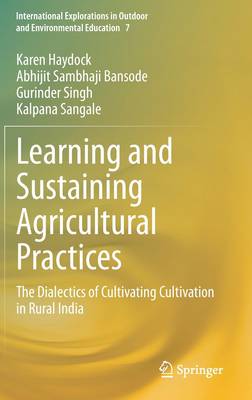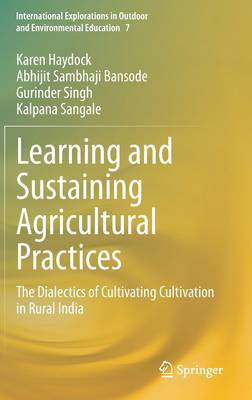
- Afhalen na 1 uur in een winkel met voorraad
- Gratis thuislevering in België vanaf € 30
- Ruim aanbod met 7 miljoen producten
- Afhalen na 1 uur in een winkel met voorraad
- Gratis thuislevering in België vanaf € 30
- Ruim aanbod met 7 miljoen producten
Zoeken
Learning and Sustaining Agricultural Practices
The Dialectics of Cultivating Cultivation in Rural India
Karen Haydock, Abhijit Sambhaji Bansode, Gurinder Singh, Kalpana Sangale
€ 105,45
+ 210 punten
Uitvoering
Omschrijving
This book describes a participatory case study of a small family farm in Maharashtra, India. It is a dialectical study of cultivating cultivation: how paddy cultivation is learnt and taught, and why it is the way it is. The paddy cultivation that the family is doing at first appears to be 'traditional'. But by observation and working along with the family, the authors have found that they are engaging in a dynamic process in which they are questioning, investigating, and learning by doing. The authors compare this to the process of doing science, and to the sort of learning that occurs in formal education. The book presents evidence that paddy cultivation has always been varying and evolving through chance and necessity, experimentation, and economic contingencies. Through the example of one farm, the book provides a critique of current attempts to sustain agriculture, and an understanding of the ongoing agricultural crisis.
Specificaties
Betrokkenen
- Auteur(s):
- Uitgeverij:
Inhoud
- Aantal bladzijden:
- 313
- Taal:
- Engels
- Reeks:
- Reeksnummer:
- nr. 7
Eigenschappen
- Productcode (EAN):
- 9783030640644
- Verschijningsdatum:
- 27/03/2021
- Uitvoering:
- Hardcover
- Formaat:
- Genaaid
- Afmetingen:
- 156 mm x 234 mm
- Gewicht:
- 662 g

Alleen bij Standaard Boekhandel
+ 210 punten op je klantenkaart van Standaard Boekhandel
Beoordelingen
We publiceren alleen reviews die voldoen aan de voorwaarden voor reviews. Bekijk onze voorwaarden voor reviews.











